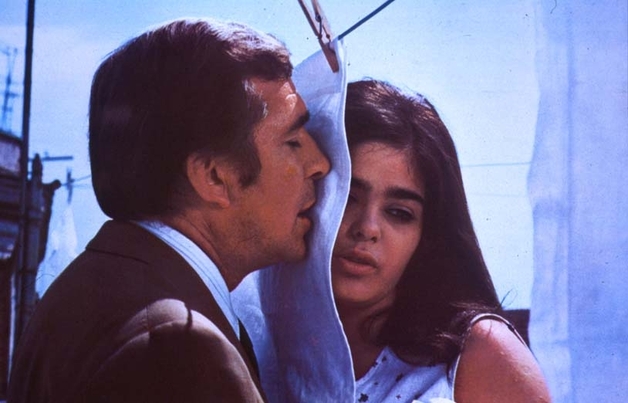“La Bambolona” is a 1968 Italian comedy film directed by Franco Giraldi, based on the novel by Alba de Céspedes. The film is a satirical take on romance, social status, and the complexities of human relationships. With its witty dialogue and sharp social commentary, “La Bambolona” provides a humorous yet insightful look at the mores of Italian society during the 1960s.
The story follows Alberto Menichetti (Ugo Tognazzi), a middle-aged, respectable man working in a bank. Alberto lives a monotonous and uneventful life until he becomes infatuated with the beautiful and much younger Susanna (Ewa Aulin), who is known as “La Bambolona” (The Big Doll). Susanna is carefree, flirtatious, and embodies the liberated spirit of the youth culture of the time. Despite the significant age difference and the disapproval of society, Alberto pursues a relationship with Susanna. This pursuit leads to a series of comedic and awkward situations as Alberto tries to reconcile his conventional lifestyle with Susanna’s modern and free-spirited approach to life and love.
“La Bambolona” explores themes of love, desire, age, and the clash between traditional values and modernity. Ugo Tognazzi’s portrayal of Alberto Menichetti is both humorous and sympathetic, capturing the character’s internal conflict and desperation to break free from his mundane existence. Ewa Aulin’s Susanna represents the youthful rebellion and changing social norms of the 1960s, challenging Alberto’s perceptions and societal expectations. The film also critiques the superficiality and materialism of society, using the characters’ interactions to highlight the absurdities and contradictions inherent in social conventions.
Franco Giraldi’s direction emphasizes the comedic elements while also delivering a poignant social critique. The cinematography captures the contrast between the orderly, structured world of Alberto and the vibrant, unpredictable life of Susanna. Giraldi uses visual humor and clever dialogue to underscore the generational and ideological differences between the characters. The film’s pacing is brisk, keeping the audience engaged as the story unfolds through a series of comedic and thought-provoking scenes.
A notable anecdote from the production of “La Bambolona” involves the casting of Ewa Aulin. Initially, there were concerns about whether she could effectively portray the nuanced character of Susanna. However, Aulin’s performance exceeded expectations, bringing a unique charm and depth to the role. Her on-screen chemistry with Ugo Tognazzi added an authentic dynamic to their relationship, making the film’s exploration of age and love more impactful. This casting choice was pivotal in the film’s success, highlighting Aulin’s talent and contributing significantly to the film’s appeal.
“La Bambolona” was well-received by audiences and critics for its humorous yet critical take on societal norms. The performances of Ugo Tognazzi and Ewa Aulin were particularly praised, along with Giraldi’s adept direction. The film’s satire of romantic and social conventions resonated with viewers, making it a noteworthy entry in the genre of Italian comedy. Over the years, “La Bambolona” has maintained its relevance, offering timeless insights into the complexities of human relationships and the changing societal landscape.
“La Bambolona” remains a significant film in Italian cinema, blending humor with sharp social commentary. Franco Giraldi’s direction, combined with strong performances by Ugo Tognazzi and Ewa Aulin, creates a film that is both entertaining and thought-provoking. The film’s exploration of themes like love, age, and societal expectations continues to resonate, making “La Bambolona” a timeless piece that reflects the enduring tensions between tradition and modernity in human relationships.
Watch the movie on Movieitaly+
Read more articles over here!






